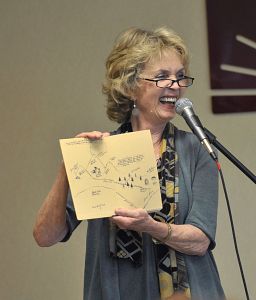

Lee Smith uses a hand-drawn map to illustrate one of her stories during a program at the Bristol Public Library. (Photo by Earl Neikirk|Bristol Herald Courier)
*** Published April 18, 2010 in the Bristol Herald Courier. ***
BRISTOL, Va. – The stories of Southwest Virginia might be different today than they were when she was a girl, nationally known author Lee Smith said Saturday, but the region's storytelling tradition is as rich as ever.
"It's a way of processing information," Smith said of the tendency of Appalachian people to spin a yarn about something as simple as directions to the post office.
Smith spoke at the Bristol Public Library as the finale to a week of events for a Community Read in honor of National Library Week. The week's events centered on the Grundy native's most well-known book, "Fair and Tender Ladies."
Before Smith spoke Saturday, actress Barbara Bates Smith (no relation) put on an interpretive performance of the book, telling the story with a simple wooden table, a quilt and musician Jeff Sebans on dulcimer.
The novel, written in the form of letters, chronicles the life of Ivy Rowe, a mountain woman who lives an ordinary life with enthusiasm.
Ivy's story is also that of a place changed from secluded homesteads to booming company towns to mountaintops stripped by bulldozers that threaten to tear up the roots planted generations before.
Lee Smith, in a speech following the dramatic interpretation of "Fair and Tender Ladies," talked about her own childhood in Southwest Virginia and the long process it took for her to discover that the small town she called home deserved a place in literature.
She remembered what it was like to come to Bristol when she was growing up: You had to dress up, and you had to pack a lunch. Back then, the breaded veal cutlet and tomato sauce she ate at Howard Johnson's represented the height of sophistication.
At home in Grundy, she was surrounded by stories.
Some of them she saw from the office of her father's dime store, watching the social goings-on of the town from up above the customers.
"I saw everything," she said. "I saw fights. I saw people spank their children. I saw embraces. I saw people stealing stuff. Once I saw a woman get a great big kind of clock radio and put it between her legs."
Amid the music and conversation of the store and Saturday bustle of the town, she'd sometimes walk across the street, perhaps with dime-store turtles perched on her shirt, to visit her grandfather, the county treasurer, at the county courthouse.
"I would go across the street and hang out with my granddaddy and hear a different kind of story: Who had burned up his house for the insurance? Or who had done this or that," she said.
At home, she would pretend to be busy drawing while she listened to her mother gossip with other women about the neighbors, discussing at length such questions as whether or not somebody really had colitis.
She was always writing as a child but didn't make very good grades when she began to study writing in college, she said. At the time she believed good stories must be written about people with exciting lives in foreign locales – and that was what she was trying to write.
"I finally wrote about my mother and my aunt sitting on the porch stringing beans and talking about whether somebody had colitis or not," she said, "and I got an A plus."
Along the way, she happened to read a book that made mention of Grundy, and seeing the name of her hometown in print, "suddenly all these things about my life and childhood occurred to me as stories," she said.
Stories, she said, about getting saved night after night at a local tent revival, and about Ralph Stanley and his brother Carter singing on the roof of the concession stand at a drive-in theatre in Vansant.
One day in the early 1980s, she was coming home to Grundy and took note of the huge satellite dishes sprouting up on top of the mountains.
"I was just thinking pretty soon everybody's gong to sound the same everywhere in the whole world." She said. "They're all going to sound like [television news anchors] Dan Rather and Connie Chung; nobody's going to sound like me anymore."
She went to her grandmother's house for corn pudding and found her grandmother ready instead for a trip to McDonald's.
"I said, "This is the end,' " she recalled. "I'd better write this down right now."
With an irreconcilable disconnect between standard English and her comfortable Appalachian dialect, she decided to let her characters tell their stories in their own words.
"Fair and Tender Ladies" was born in a box of old letters that Smith bought for $4.50 at a yard sale.
Answering questions at the end of her speech, she described the kind of homogeneity that's overtaken much of the nation: the chain stores, chain restaurants, chain malls. Stories persist despite these changes, she said.
The stories Appalachian writers are turning out today are different from those written a generation ago, she said, "but they're all wonderful."
"Obviously, places are changing. ... We're all turning into a mall outside Cincinnati," she said. "But this area, I think, has the sense of narrative, the sense of story. You ask anybody any kind of question, and they're going to tell you a story about it."
THERE'S MORE:
To read an A! Magazine story on Lee Smith, click HERE.